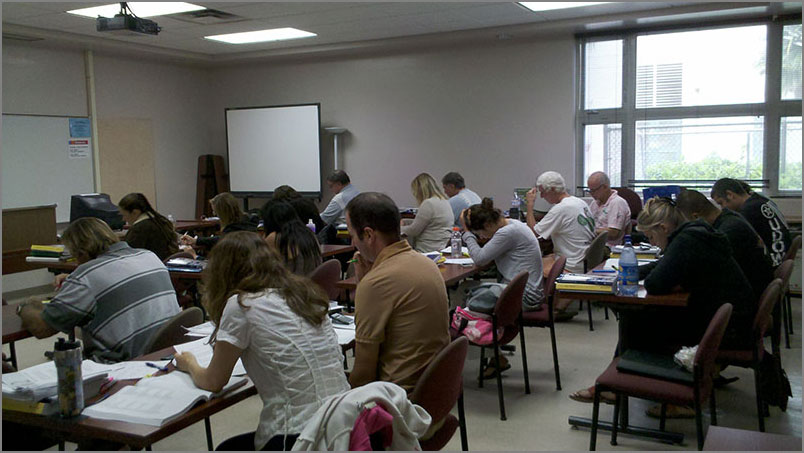What Courses Are Offered at a Real Estate School? A Complete Overview for Aspiring Representatives
Hopeful realty representatives have a diverse range of training courses offered to boost their expertise and abilities. These offerings vary from fundamental classes in realty principles to specialized training in areas like building monitoring and commercial realty. Understanding the different instructional courses can be crucial for success. What necessary subjects and techniques will these courses cover, and just how might they form an agent's profession?
Understanding the Basics: Property Principles
The foundation of realty understanding hinges on recognizing its principles. These principles incorporate vital concepts that govern the purchasing, selling, and administration of properties. Key topics include residential or commercial property possession, land usage, and the various legal rights connected with ownership. Comprehending the distinctions in between household, business, and industrial residential properties is important, as each category has unique market characteristics.
In addition, trainees discover market analysis, which entails assessing building worths and patterns to make educated decisions (Real Estate School). Actual estate principles likewise cover the importance of contracts and the lawful structure that sustains realty deals. Familiarity with funding choices, such as financings and mortgages, is vital for guiding the financial facets of property. Overall, a strong understanding of these principles gears up ambitious agents with the foundational understanding required to be successful in the affordable property industry, leading the way for additional specialized training and licensing

Licensing Requirements and Test Preparation
Aspiring actual estate agents must browse details licensing needs to exercise lawfully in their corresponding states. These needs usually consist of completing an assigned number of hours in pre-licensing education and learning, which covers necessary topics such as realty legislation, values, and property administration. Prospects must additionally pass a state examination that analyzes their understanding and understanding of these topics.
Examination preparation is essential for success. Lots of realty colleges provide test preparation programs that offer practice inquiries, research study overviews, and testimonial sessions. These sources assist candidates familiarize themselves with the examination layout and content. In addition, signing up with study groups or using on-line systems can improve discovering via joint review and discussion.
When the exam is passed, representatives need to get their license with the state's actual estate commission, usually come with by history checks and fees. Satisfying these licensing needs ensures that representatives are geared up to serve clients successfully and morally in the property market.
Specialized Courses: Building Administration
Comprehending the complexities of residential or commercial property administration is crucial for genuine estate specialists looking for to enhance their proficiency in this specialized field. Home management courses supply agents with useful insights into the daily operations of handling domestic and industrial residential or commercial properties. These courses normally cover crucial topics such as renter connections, lease contracts, and building upkeep.
Furthermore, aiming building supervisors find out about financial administration, including budgeting and rent collection approaches, as well as lawful responsibilities associated with tenant legal rights and building laws.
Programs might likewise explore advertising techniques for bring in renters and tools for property administration software program that enhance operations. By finishing specialized property administration training courses, realty professionals can much better outfit themselves to deal with the difficulties of taking care of properties effectively, eventually leading to boosted customer satisfaction and organization development. This knowledge is essential for those intending to master the affordable realty market.
Commercial Real Estate: A Different Perspective
Industrial property runs under special market characteristics that distinguish it from domestic homes. Understanding investment strategies details to this sector is crucial for success, as is acknowledging the relevance of networking chances offered to specialists. These aspects together form an all-encompassing technique to passing through the intricacies of industrial property.
One-of-a-kind Market Dynamics

Investment Methods Explained
Various investment techniques exist within the domain name of commercial real estate, each tailored to fulfill specific economic objectives and market conditions. One usual method is value-add investing, where investors obtain underperforming residential properties, boost their value with remodellings, and ultimately enhance rental earnings. One more approach is core investing, focusing on stabilized, high-grade assets in prime areas that give consistent cash circulation. Additionally, opportunistic investing involves higher risk, targeting residential or commercial properties needing considerable redevelopment or in arising markets. Genuine estate investment company (REITs) supply a much more easy method, enabling individuals to buy a diversified portfolio of business homes. Lastly, crowdfunding systems have actually arised, enabling small financiers to take part in larger business offers, democratizing accessibility to the industrial actual estate market.
Networking Opportunities Available
In the domain name of realty investing, constructing a robust professional network can substantially enhance possibilities for success. Networking chances are plentiful at real estate institutions, where hopeful representatives can link with sector professionals, instructors, and fellow pupils. Workshops, seminars, and guest lectures often feature knowledgeable agents and brokers who share insights and experiences, giving very useful calls. Numerous institutions additionally promote local meetups and networking events, encouraging students to engage with the wider genuine estate area. Furthermore, online systems and discussion forums related to these programs enable continuous communication and partnership. By leveraging these possibilities, trainees can cultivate partnerships that might cause mentorship, collaborations, and possible work positionings, ultimately assisting in their professional development within the competitive commercial property field.

Realty Investment Strategies
Property investment strategies differ significantly, encompassing approaches such as rental building investments, flipping homes, and engaging with Property Investment Trust Funds (REITs) Each method offers unique possibilities and risks that capitalists must meticulously take into consideration. Understanding these options is crucial for any individual seeking to build a successful property portfolio.
Rental Building Investments
Numerous capitalists locate rental residential property investments to be a compelling technique for building riches and producing easy income. This strategy entails buying residential or industrial homes to rent to lessees, making sure a consistent money flow. Effective rental property investments need extensive marketing research, evaluating building values, and recognizing regional rental demand. Capitalists usually take advantage of tax benefits, such as devaluation and mortgage interest deductions. Additionally, residential property administration abilities are crucial for preserving renter relationships and guaranteeing prompt rent collection. Long-lasting admiration of residential property values can additionally boost a financier's portfolio. Overall, rental home financial investments can provide a secure income and add to financial safety, making them an eye-catching alternative for numerous in the real estate market.
Flipping Residences Methods
Turning homes has arised as a popular approach genuine estate financiers looking for fast returns on their investments. This method entails acquiring undervalued residential or commercial properties, making required renovations, and marketing them at a higher price. Successful house fins usually carry out extensive market research to determine encouraging neighborhoods and properties with capacity for appreciation. They typically concentrate on cosmetic upgrades, such as bathroom and kitchen remodels, to improve allure without spending too much - Real Estate School. Additionally, comprehending funding options and taking care of budget plans are crucial for optimizing revenues. Time is essential go to this web-site in this technique, as extended improvements can erode revenue margins. Ultimately, turning houses calls for a mix of market understanding, renovation skills, and monetary acumen to be effective in a competitive genuine estate landscape
REITs and Diversity
Direct home financial investment can generate high returns, Real Estate Financial Investment Trust Funds (REITs) supply an engaging alternative that enables financiers to diversify their portfolios without the complexities of taking care of physical residential or commercial properties. REITs are companies that own, operate, or financing income-producing realty throughout different sectors, including domestic, commercial, and industrial residential or commercial properties. By buying REITs, people can acquire direct exposure to property markets without the requirement for considerable funding or direct monitoring obligations. This financial investment lorry likewise gives liquidity, as shares can be quickly acquired and marketed on supply exchanges. Additionally, REITs often pay dividends, providing a regular earnings stream. In general, including REITs right into a profile can enhance diversity and alleviate threats related to traditional property financial investments.
Continuing Education And Learning and Professional Advancement
As the property market advances, professionals should engage in proceeding education and find more information professional development to stay competitive and notified. This recurring knowing is vital for adjusting to adjustments in laws, modern technology, and market trends. Actual estate colleges use numerous programs created to enhance abilities and expertise, consisting of sophisticated negotiation techniques, residential or commercial property monitoring, and advertising strategies.
Several states require qualified agents to finish a collection number of continuing education hours to preserve their licenses. These courses often cover basic subjects such as ethics, fair real estate guidelines, and threat monitoring.
Furthermore, industry workshops and workshops offer networking possibilities, permitting representatives to link with peers and industry leaders. By getting involved in these curricula, real estate professionals can assure they remain skilled and receptive to client requirements, eventually causing occupation development and success in a dynamic industry.
Regularly Asked Inquiries
What Is the Normal Period of Property Courses?
The common duration of realty programs varies, typically ranging from a few weeks to a number of months. Factors influencing this duration consist of course material, delivery method, and state requirements, influencing hopeful representatives' academic timelines.
Are Online Courses Available genuine Estate Education And Learning?
Yes, numerous on-line courses are available for actual estate education. These programs give adaptability and access, enabling people to learn at their own rate while covering necessary topics necessary for getting realty licenses and expertise.
Just How Much Do Realty Courses Usually Expense?
Realty courses normally vary from $200 to $1,500, relying on the institution and course size. Extra fees for products, exams, and state licensing may likewise apply, contributing to the general price of education and learning.
Can I Take Real Estate Courses Part-Time?
Yes, people can take property training courses part-time. Many schools offer versatile organizing alternatives, allowing aspiring representatives to balance their research studies with various other commitments, making it accessible for those with hectic way of lives.
What Occupations Can I Seek After Finishing Real Estate Courses?

These offerings range from foundational classes in actual estate concepts to specialized training in locations like property management and commercial real estate. Actual estate concepts also cover the significance of contracts and the lawful structure that supports real estate deals. While many actual estate specialists focus on domestic markets, the dynamics of business real estate present unique difficulties and opportunities that need a different technique. Actual estate investment strategies differ considerably, including strategies such as rental property financial investments, turning homes, and involving with Real Estate Financial Investment Depends On (REITs) Direct residential property investment can yield high returns, Real Estate Financial Investment Depends On (REITs) offer a compelling check my reference option that enables capitalists to expand their portfolios without the intricacies of managing physical residential properties.